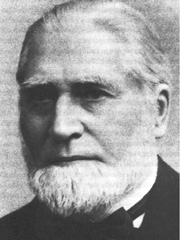Julius lions
Julius Löwen (born July 31, 1822 in Breckerfeld , † August 9, 1907 in Elberfeld ) was a German merchant, silk manufacturer and hymn poet. He belonged to the founding generation of the German Brotherhood Movement . He is best known as a free church song writer .
Life
Origin, professional career and family
Julius Löwen came from a family of bakers . His parents, Johann Peter Nikolaus Löwen (1788–1862) and Anna Elisabeth born. Flüs (1793–1881), ran a small farm and a grain mill in addition to the bakery . They had four children, of whom Julius Löwen was the oldest. After attending the municipal rectorate school, which he graduated as one of the best students, he began an apprenticeship in Elberfeld. His further professional career led him to Mettmann , where he found a job as a businessman in a local textile factory. In 1850 he went into business for himself together with a friend and founded the silk weaving mill Löwen & Nordsieck . After two years, he moved their headquarters from Mettmann to Elberfeld. In mid-1873 Löwen retired for health reasons.
On June 5, 1851, Julius Löwen married Helene Langenbeck (1830–1915), who came from a family of industrialists from Unterbarmer . They had two sons: Ernst (* 1854) and Ewald (* 1862).
Löwen's path to the Brethren Movement
From a young age, Julius Löwen was very interested in theological issues. The Wuppertal pastor Friedrich Wilhelm Krummacher (1796–1868) had a great influence on him, and his biblical sermons even deeply impressed Friedrich Engels and Felix Mendelssohn Bartholdy . He turned to the intensive study of the Bible and read in the so-called edification literature . In 1842 he wrote to a friend: “Meanwhile I was busy reading the Bible and edifying books and learned more and more to see that I was not right and that if I wanted to be saved I would have to be completely changed . Then the gospel opened to me the abundance of its treasures; it introduced me to a man who could save me from eternal ruin; who atoned for all my countless sins on the cross, who fulfilled the law for me and, having given me his righteousness, made me pleasant before the Father ”.
Julius Löwen received the decisive impulse to join the then still young brother movement from his brother-in-law Carl Brockhaus . Brockhaus had resigned from his position as a teacher and helped set up the Christian assemblies full-time , primarily through the publication of Christian literature. Brockhaus won Löwen as an employee in the movement's teaching and pastoral service and as an employee of the magazine Ambassador des Heils in Christo . Long-term guests at Löwen's house also included the leader of the British Brethren movement, John Nelson Darby .
plant
Julius Löwen has made a name for himself both inside and outside the Brethren movement, primarily as a song writer. The songs Dir, the Exalted Lord (1877), Adoration You, the Lamb (1886) and Adoration, Honor, Thanks and Fame (1884) are still used in worship today . A setting of the Bible verses from Rev 1.5-6 ELB To the One Who Loves Us , which was included in various hymn books, for example in Celebrations & Praise (No. 155) , also comes from Leuven .
literature
- Arend Remmers : Remember your leaders. Life pictures of some faithful men of God . Christian publication, Hückeswagen ²1990. Pp. 72-75. ISBN 3-89287-360-7
- Gerhard Jordy: The Brethren Movement in Germany . Volume 1. R. Brockhaus, Wuppertal, 1989. ISBN 3-417-24060-3
Web links
Individual evidence
- ↑ Quoted from Arend Remmers, Gedenket your Führer. Life pictures of some faithful men of God ; Hückeswagen 2 1990, p. 72f.
| personal data | |
|---|---|
| SURNAME | Leuven, Julius |
| BRIEF DESCRIPTION | German merchant, silk manufacturer and hymn poet |
| DATE OF BIRTH | July 31, 1822 |
| PLACE OF BIRTH | Breckerfeld |
| DATE OF DEATH | August 9, 1907 |
| Place of death | Elberfeld |
